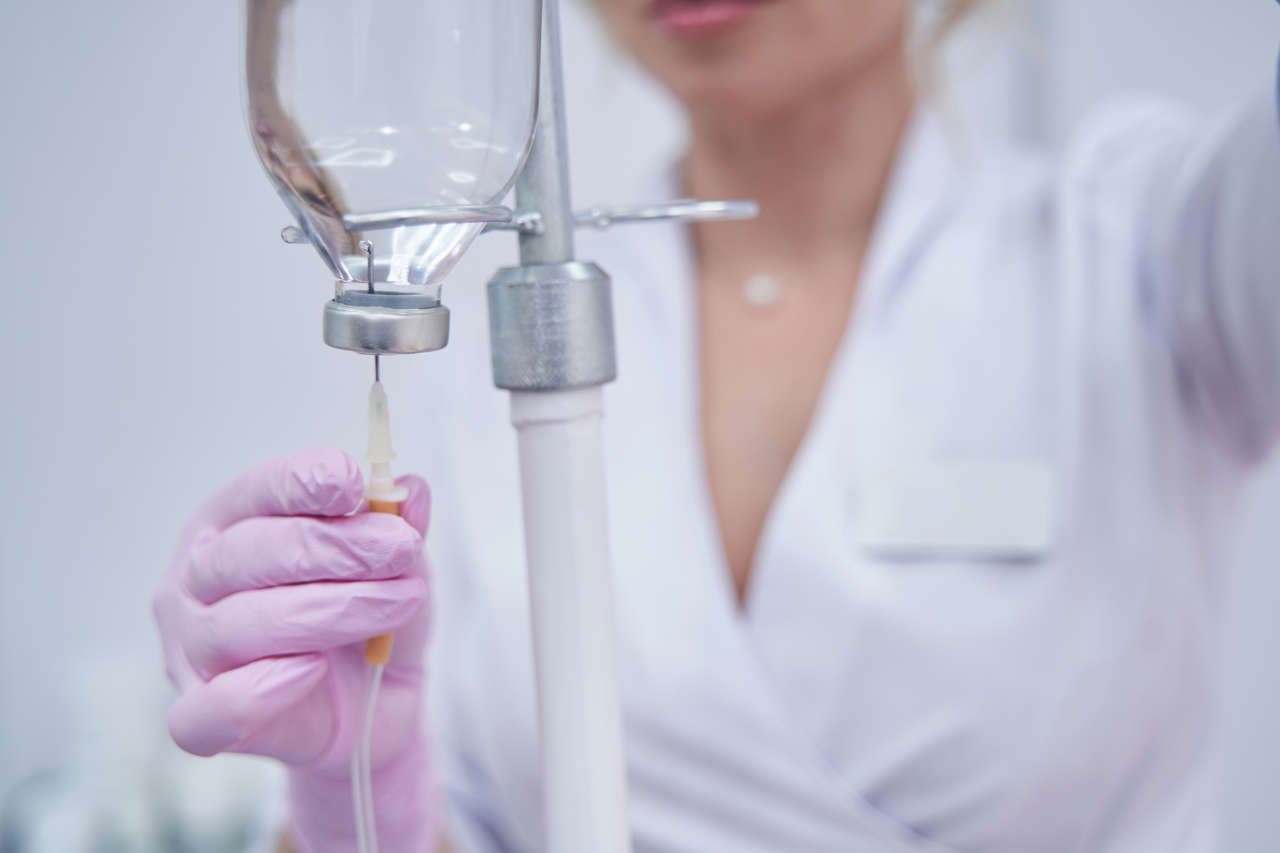
静脉注射免疫球蛋白(IVIG) 和血浆置换都是治疗自身免疫性疾病的方法。
获得 IVIG 共同支付援助
IVIG 财务援助IVIG是一种血液衍生产品,由抗体溶液组成。它由数千名捐献者的血清制成。该药物的给药剂量为每公斤体重200-400毫克,疗程为5天(或遵医嘱)。
相反,血浆置换术是指从体内抽取血浆,然后用合适的液体替代的手术。这种疗法因其在治疗自身免疫性疾病、神经系统疾病和其他各种疾病方面的有效性而获得认可。
本文将深入探讨静脉注射免疫球蛋白(IVIG)和血浆置换,并进行比较分析,阐明它们在各种疾病治疗中各自的作用。这篇内容全面的文章将为医疗专业人士和希望深入了解这些疗法的患者提供巨大的帮助。
IVIG:机制和用途
静脉注射免疫球蛋白 (IVIG) 是一种关键且高度专业化的治疗技术,用于治疗多种免疫缺陷疾病和医学问题。这种药物源自健康供体的混合抗体,与多种免疫系统成分发生复杂的相互作用。
作用机制
IVIG 通过增加抗体生成来增强人体的免疫反应,使其能够更有效地抵抗感染。此外,它还能控制免疫细胞受体,调节细胞因子的合成,激活补体系统(免疫系统的重要组成部分),并微调免疫细胞的行为。
尽管IVIG应用广泛,但仍迫切需要更全面地了解其疗效的确切机制。其有效性会根据所治疗的具体疾病和所用剂量而波动。
IVIG的使用
在许多炎症和免疫介导疾病中,抗体缺陷可以通过静脉注射免疫球蛋白(IVIG)疗法得到有效治疗。许多疾病可以通过静脉注射免疫球蛋白(IVIG)得到缓解。
这些包括自身免疫性疾病,例如:
- 格林-巴利综合征(GBS)
- 慢性炎症性脱髓鞘性多发性神经病(CIDP)
- 重症肌无力(MG)
- 多灶性运动神经病(MMN)
- 皮肌炎(DM)
- 多发性肌炎(PM)
- 系统性红斑狼疮(SLE)
- 类风湿性关节炎(RA)
- 硬皮病
- 血管炎
- 免疫缺陷,例如原发性免疫缺陷病 (PIDD)
IVIG的优势
IVIG 疗法具有以下潜在益处:
- 降低免疫缺陷患者的感染严重程度和频率。
- 缓解自身免疫性疾病的炎症。
- 增强重症肌无力患者的肌肉力量
然而,了解IVIG疗法的相关限制至关重要。这些限制包括治疗费用高昂,以及可能出现的副作用,例如头痛、发烧、发冷、恶心、呕吐、低血压、过敏反应、血栓或肾脏损害。
询问 IVIG 家庭输液
血浆置换:机制和用途
血浆置换术(plasmapheresis)是一项重要的医疗技术,通常也称为血浆交换或血浆分离术,用于治疗多种疾病。该疗法的主要目的是通过提取血液中的血浆,并用健康血浆或合适的替代血浆进行替换,以解决潜在问题。
作用机制
血浆置换术的作用是清除体内有害抗体。单克隆副蛋白、致病性自身抗体、免疫复合物和冷球蛋白都是这类缺陷抗体的例子。血浆置换有助于清除这些有害抗体,尽管其确切机制尚不完全清楚。
血浆置换的用途
血浆置换术广泛应用于多种医疗状况,特别是治疗自身免疫性疾病。
这些疾病的一些例子是:
- 重症肌无力(MG)
- 格林-巴利综合征(GBS)
- 慢性炎症性脱髓鞘性多发性神经病(CIDP)
- 古德帕斯彻综合征
此外,血浆置换术可有效治疗多发性硬化症 (MS) 和慢性疲劳综合征 (CFS) 等神经系统疾病。它还可用于治疗血栓性血小板减少性紫癜 (TTP) 和溶血性尿毒症综合征 (HUS) 等血液系统疾病。
血浆置换的优势
血浆置换具有多项显著优势,部分优势如下:
- 快速清除血液中的有害物质
- 减少与自身免疫性疾病相关的炎症
- 某些神经系统疾病的神经系统症状的潜在改善
IVIG 与血浆置换的比较

血浆置换和静脉注射免疫球蛋白 (IVIG) 是治疗各种疾病的有效疗法。然而,IVIG 与血浆置换的疗效取决于所治疗的具体疾病。血浆置换是 更有效 与 IVIG 相比,它可以有效去除同种抗体。
感染和过敏反应是这两种疗法的潜在副作用。然而,静脉注射免疫球蛋白(IVIG)通常比血浆置换疗法更安全。
在决定采用 IVIG 还是血浆置换之前,必须考虑许多因素,包括患者特征、疾病严重程度和治疗目标。
以下是区分两种治疗程序的简要表格:
| 免疫球蛋白 | 血浆置换 | |
| 作品 | 来自多个供体的浓缩抗体 | 去除患者的血浆并用替代溶液代替 |
| 作用机制 | 通过注入抗体来增强被动免疫 | 直接从血液中清除与疾病相关的抗体和有害因素 |
| 治疗速度 | 需要更长的给药时间 | 可以达到快速去除致病因素 |
| 适应症 | 自身免疫性疾病、免疫缺陷和其他免疫介导疾病 | 自身免疫性疾病和神经系统疾病 |
| 潜在风险 | 不良反应,成本高 | 血管通路并发症,需要频繁治疗 |
治疗信息
获得 IVIG 事先授权案例研究和研究结果
神经系统疾病和自身免疫性疾病均可通过静脉注射免疫球蛋白(IVIG)和血浆置换术成功治疗。大量研究比较了这两种疗法在不同情况下的疗效。
一个 学习 一项研究发现,静脉注射免疫球蛋白(IVIG)在治疗慢性炎症性脱髓鞘性多发性神经病(CIDP)方面比血浆置换更有效。另一项研究发现,血浆置换在治疗格林-巴利综合征方面比静脉注射免疫球蛋白(IVIG)更有效。
此外,案例研究的积极成果提升了静脉注射免疫球蛋白(IVIG)和血浆置换的价值。一项案例研究证明了IVIG在治疗自身免疫性溶血性贫血方面的有效性。另一份病例报告则证明了血浆置换在治疗血栓性血小板减少性紫癜方面的有效性。这些案例展现了这些治疗方法的具体效果以及在现实临床环境中的潜在应用价值。
得益于 IVIG 和血浆置换,医疗保健专业人员和患者拥有了有希望的治疗替代方案来应对自身免疫性疾病和神经系统疾病的难题。
哪种治疗方案更合适?静脉注射免疫球蛋白 (IVIG) 还是血浆置换?
IVIG(静脉注射免疫球蛋白)和血浆置换都是治疗多种疾病(包括自身免疫性疾病)的有效方法。
然而,选择最佳治疗方法取决于多种因素,包括疾病的性质、安全隐患以及费用考量。为了找到适合您具体情况的最佳治疗方案,请联系医疗保健专家。













